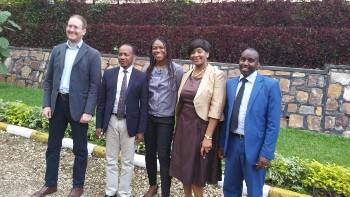Promoting Responsible Business Practice in East Africa

As East Africa’s economy rapidly develops, the ROLE UK Programme is supporting a partnership between the East Africa Law Society (EALS) and Advocates for International Development (A4ID), which seeks to limit the negative impacts of business activity on local communities.
East Africa has been named by the African Development Bank as one of the fastest growing economic regions in Africa. Many new economic opportunities are emerging in the region, particularly with the discovery of oil in Kenya and Uganda, and economic policy reforms brought about by the integration of the East Africa Community. Corporate activity is vital for economic growth, with businesses providing jobs and services, as well as contributing to public funds by way of taxation.
In parallel, however, the operations and activities of businesses can have a sizeable and harmful impact on human rights. Such impacts include, but are not limited to, exploitation of land rights, discrimination, poor labour conditions, child labour, a lack of safety and security, and failure to meet the living wage. Alongside the state, the private sector has an obligation to respect human rights and must pay special attention to vulnerable groups, including women, children, people with disabilities, indigenous peoples, migrant workers and older persons, as set out in the UN Guiding Principles on Business and Human Rights.
Engaging commercial lawyers in business and human rights
The UN Guiding Principles on Business and Human Rights are a set of guidelines that underpin the obligation of business enterprises to comply with and respect human rights and individuals’ freedoms. By adhering to the guidelines, businesses are able to function ethically, whilst retaining their market objectives. Commercial lawyers play a key role in ensuring that enterprises follow these guidelines, especially in developing countries, where local communities are often exploited.
Without relevant training, East African lawyers tend to lack awareness of the role of the legal profession in ensuring that businesses respect the human rights of the people that their activities effect. The partnership between A4ID and EALS aims to not only raise awareness of the UN Guiding Principles on Business and Human Rights among East Africa’s legal profession, but also increase lawyers’ capacity to act on their newly acquired knowledge.
The President of the Uganda Law Society urged young lawyers to embrace business and human rights as an emerging area of legal practice that offers their clients novel and specialised services, during a training in Kampala in 2017.
Since 2016, the ROLE UK Programme has supported A4ID and EALS to organise a number of trainings on the UN Guiding Principles on Business and Human Rights in Kenya, Rwanda, Tanzania and Uganda. Delivered by experts from leading international law firms, including Clifford Chance, Morrison & Foerster, Allen & Overy and Norton Rose Fulbright, the trainings have reached more than 500 East African lawyers. The trainings are designed to build the professional capacity of lawyers to advise businesses on how to integrate respect for human rights throughout their operations, and spearhead momentum among commercial lawyers to embrace and advocate the role of the legal profession in advancing human rights.
Building on lawyers’ knowledge to enact change
Prior to receiving training, 40 per cent of participating lawyers reported an understanding of human rights policies and legal mechanisms to implement the UN Guiding Principles on Business and Human Rights in 2017. As a result of the training, 100 per cent of participants indicated that they had gained this knowledge. According to Commissioner Jedidah of the Kenya National Commission on Human Rights, attendees at the EALS Annual Conference in November 2019, also demonstrated increased awareness and interest in business and human rights compared to the previous year’s conference. She explained that it was clear that participants were beginning to build their understanding of the importance of business and human rights’ principles for development by asking, “What can we do as lawyers? What can I do in my institution? How do I go about it?”
While this is positive progress and indicates the changing approach of corporations and corporate lawyers in the way they operate and run their businesses to prioritise human rights, the Commissioner stressed that more can be done to, “deepen the discussions on business and human rights and the important role that lawyers in each East African country play”.
To consolidate their continued collaboration to promote responsible business practices in East Africa and build on the progress that has already been made, EALS and A4ID signed a Memorandum of Understanding in May 2019. Through its continued support for this partnership to provide training on the UN Guiding Principles on Business and Human Rights, the ROLE UK programme hopes to encourage lawyers to use their professional leverage to influence businesses to assess the impact of their activities on people and offer solutions to business-led human rights abuses in the region.
Going forward, A4ID and EALS are planning to contribute to the development of National Action Plans on Business and Human Rights in East Africa by ensuring that the legal community makes its voice heard and advocates for an inclusive, transparent and participatory process. With input from lawyers who have the relevant expertise, the National Action Plans will be a powerful tool for promoting implementation of the UN Guiding Principles on Business and Human Rights.
Case study category:

